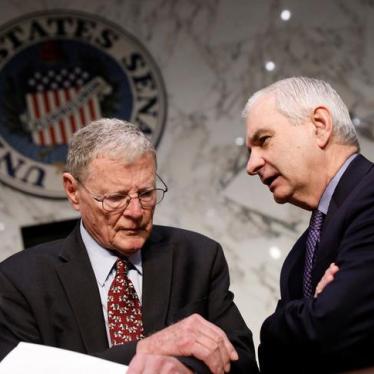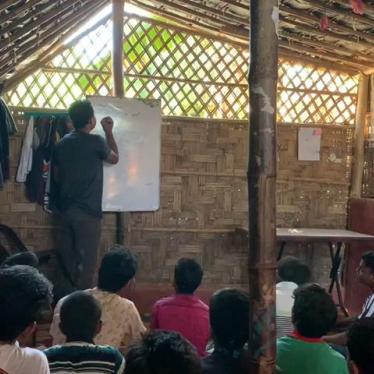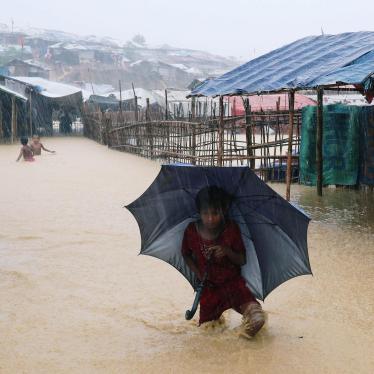Co-Chairmen Representatives McGovern and Hultgren and members of the commission, thank you for the opportunity to testify at today’s hearing on human rights and the use of sexual violence by the Burmese military against ethnic minorities in Burma.
Human Rights Watch has conducted research on the human rights situation in Burma for more than 25 years, focusing on abuses against political dissidents and media, as well as laws-of-war violations in the armed conflicts in ethnic minority areas. Human Rights Watch has documented numerous abuses associated with Burma’s military operations. We have frequently documented the systematic use of rape and other sexual violence by the Tatmadaw, or Burmese armed forces, not just in the most recent violence against the Rohingya but against other ethnic groups as well. In our interviews with victims, we have witnessed their pain, shame, and distress – injuries that have corroded their personal sense of self as well as the strength of their communities.
Widespread sexual violence perpetrated by Burmese soldiers has been a hallmark of the culture of abuse and impunity in Burma’s decades-long civil wars with its ethnic groups. Despite promises made during the country’s democratic transition since 2011, the Tatmadaw continues to shield its soldiers from prosecution for crimes committed in military operations including in Kachin, Shan, and Rakhine States. Military rape is linked to other abuses, including extrajudicial killings, torture, arson, land confiscation, and denial of humanitarian aid. We have also documented repeatedly how the authorities have, through intimidation and flat denial, stopped efforts by groups and individuals, including brave women, to achieve recognition and justice for survivors of rape or to end abusive practices of gang rape and the toxicity of fear of rape and shame that spreads across communities.
The apparently hopeless situation facing Rohingya survivors of brutal gang rape by Burmese security forces, now in the miserable sanctuary of Bangladesh refugee camps, has been brought upon countless other victims over several decades, among many of Burma’s ethnic minorities. For victims, the attacks cannot be forgotten, but within Burma no realistic path to justice or clear plan to hold military perpetrators accountable exists.
In September and October 2017, I spent two weeks in Rohingya refugee camps in Bangladesh. I interviewed 52 Rohingya women and girls, including 29 survivors of rape, who had fled to Bangladesh to escape the Burmese military’s campaign of ethnic cleansing that began on August 25, 2017. The rape survivors I spoke with were from 19 different villages in Burma’s Rakhine State, mostly in northern Buthidaung and Maungdaw townships.
In every case described to Human Rights Watch, the perpetrators were uniformed members of security forces. All but one of the rapes reported to Human Rights Watch were gang rapes, involving two or more perpetrators, but usually larger groups of soldiers who also sometimes stripped, beat, bit, laughed at, and taunted their victims. Women described soldiers in boots kicking them and beating them with rifles. In eight cases, women and girls reported being raped by five or more soldiers. Fifteen-year-old Hala Sadak, from Maungdaw township, said that large areas of scarring on her right leg and knee were from where soldiers had stripped her naked and then dragged her from her home to a nearby tree where, she estimates, about 10 men raped her from behind.
Human Rights Watch documented six cases where Burmese military units committed “mass rape” of villagers, such as in Tula Toli village, officially known as Min Gyi, in Maungdaw township. In these instances, survivors said that soldiers gathered women and girls together in groups and then gang raped or raped them, sometimes then locking them in shelters that they set on fire.
Burmese security forces raped and sexually assaulted women and girls both during the abusive “clearance operations” beginning late August 2017, as well as in the weeks prior to these major attacks, sometimes after repeated harassment. Rohingya women and girls told Human Rights Watch they had been afraid of rape for many months prior to these events, and had often experienced sexual harassment and assault from security forces and civilians aligned with those forces as part of their everyday lives.
As with other survivors of Tatmadaw rape over decades, Rohingya rape survivors spoke of enduring numerous abuses at once. In addition to being raped, women described with great distress seeing security forces murder their young children or elderly parents. Many reported witnessing cruelty toward those especially vulnerable, such as a soldier killing a 5-year-old girl who could not keep pace with her fleeing family by smashing her skull with the butt of his gun, or security forces pushing older people who could not flee back into burning houses. Two women we spoke to were forced to choose which child to save; one rape victim had to leave one behind her in a burning house.
Shocking, but none of this should have surprised us. In late 2016 and early 2017, before the August attacks began, Human Rights Watch had already begun documenting the role of sexual violence in the military’s Rakhine State operations. In interviews with 40 Rohingya refugees who had fled Rakhine State in late 2016, Human Rights Watch documented 28 incidents of rape and other sexual assault by Burmese military and border guards, some of which involved several victims. Many survivors reported being insulted and threatened on an ethnic or religious basis during the assaults. In the rain-drenched Bangladesh refugee camps, I interviewed two Rohingya women who had been raped twice by soldiers, once in early 2017 and then again as operations intensified in the end of August of that year.
Anyone in this room who has heard a survivor describe a rape endured will know how terrible each individual story is. But we have been hearing about military rape of women from Burma’s ethnic minorities for years. The absence of any accountability for such atrocities enables it to continue.
In 2011, Kachin civilians described to Human Rights Watch how Burmese army soldiers attacked Kachin villages, razed homes, pillaged properties, and forced the displacement of tens of thousands of people. My colleagues documented mass rape by soldiers as well as gang rape of individuals, and collected other reporting of the same by brave partner organizations. This was far from the first time Human Rights Watch had interviewed Kachin survivors of rape. In 1994, we also interviewed survivors who had fled the army’s burning of their villages, mass displacement, forced labor, and killings in the 1970s, 1980s, and 1990s.
In 2005, we documented that violations of international human rights and humanitarian law were carried out by the Tatmadaw in eastern Karen State, which runs along Thailand’s northwest border. Our partners documented widespread and continuing sexual violence against ethnic women in Karen State by the Burmese military. The Karen Women’s Organization (KWO) documented 125 cases of sexual violence committed by military troops in Karen State from 1988 until 2004, half committed by high-ranking military officers. According to the KWO report, 40 percent of the cases were gang rapes. In 28 percent, women were raped and then killed. The Women’s League of Burma reported rapes and gang rapes in 2003 and 2004 in all provinces with significant ethnic minority populations, as well as in central Burma. The report implicated senior and junior military personnel as being perpetrators or complicit in the majority of documented rapes. The women’s organizations subsequently reported intimidation of survivors and witnesses.
In 1990, we documented ongoing human rights abuses and repression by the Tatmadaw in Burma’s western Chin State, which borders India. Again, the pall of fear pulled over communities lasted much longer and affected many more than survivors of brutal rape. At that time, Chin women and girls told us how they lived in fear of rape and other forms of sexual violence by Tatmadaw soldiers.
In mid-2016, we reported on how women have been sidelined from the peace process initiated to resolve the longstanding armed conflicts in ethnic areas, despite many years of human rights and peace activism by women, and the disproportionate impact of conflict-related sexual violence on women. As the FY19 bill continues to move, the United States Congress should help ensure that women, including survivors, have a political voice, and, together with allies such as the United Nations, should design long-term programs to assist survivors, in contrast to the Trump administration’s determination to cut aid.
Earlier this week, despite significant bipartisan support in both houses of Congress, the FY19 defense authorization bill conferees failed to include language in the final bill that would have authorized targeted, appropriate measures against key individuals who bear responsibility for atrocities, including sexual and gender-based violence. This body – the House of Representatives – voted overwhelmingly (382-30) to bar US assistance or cooperation with Burma’s military until those responsible for human rights crimes committed in Rakhine State and elsewhere were held accountable. Disappointingly, the Senate did not concur. But even without this law, the administration still has a number of options and authorities to impose targeted sanctions – and it should waste no time in doing so.
We understand the Treasury Department continues to delay the imposition of sanctions on a list provided by the State Department for unclear reasons. Last December, the Trump administration sanctioned one individual – Maung Maung Soe, the Burmese army’s former chief of Western Command – for his role in overseeing “the military operation in Burma’s Rakhine State responsible for widespread human rights abuse against Rohingya civilians.” The imposition of this sanction was an important step, but there are many more individuals who should be sanctioned for their roles in atrocity crimes in Rakhine State, including those currently under consideration by the Treasury Department. For its part, Congress will now have to pressure the administration in other ways, including by ensuring that sexual and gender-based violence is included in discussions about possible individuals to sanction.
As you may know, the administration is conducting an extensive and intensive investigation into alleged crimes against the Rohingya, documenting allegations of murder, rape, torture, and other offenses that could, down the road, be used to prosecute members of Burma’s military for atrocity crimes, including as a matter of command responsibility. At a recent Senate hearing, Secretary of State Mike Pompeo committed publicly to releasing the findings of this report and acknowledged the importance of doing so. We believe that a public release is essential to help craft a clear and compelling narrative about the widespread abuses against the Rohingya people – documented by a wide range of organizations and institutions. This is particularly important as the military continues to deny that atrocities occurred. We hope the release of this report will trigger an adequate response, including increased bilateral engagement from the State Department and USAID to assist Rohingya refugees, and more diplomatic pressure at the UN Security Council to move the dial on accountability.
The US government, which has contributed significant development aid to Burma throughout its democratic transition, should make it explicitly clear that unchecked sexual violence and other abuses by the Burmese military are unacceptable, and that the absence of any steps toward accountability has impaired what was until recently a growing US-Burma relationship. To that end, this Congress should ensure, particularly as the FY19 appropriations process continues to move forward, that there are adequate funds to support the health needs – both physical and psychosocial – of the women and girls impacted by Burmese military violence.








